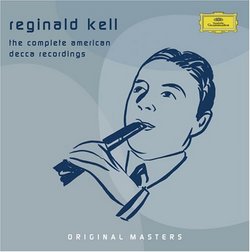Search - Wolfgang Amadeus Mozart, Ludwig van Beethoven, Robert Schumann :: Reginald Kell: Complete American Decca Recordings
 | Wolfgang Amadeus Mozart, Ludwig van Beethoven, Robert Schumann Reginald Kell: Complete American Decca Recordings Genres: Dance & Electronic, Soundtracks, Classical
|
Larger Image |
CD Details |
CD ReviewsA long overdue collection by one of the English masters of t Bridge Rodking | West Country, UK | 01/05/2007 (5 out of 5 stars) "The Yorkshireman Reg Kell became famous for using vibrato in the classical world when it was unfashionable. He used it tastefully, and other artists such as Jack Brymer and Emma Johnson have continued to use it. He also had a series of tutorials with Benny Goodman (for Goodman's benefit) which led to Goodman changing his embouchure from the upper teeth on mouthpiece to the upper lip - as well as lower, -on mouthpiece, which perhaps in Goodmans's case was not a good move, as he had it right the first time!. However these recordings originally came out a very long time ago in the early days of vinyl, and a re-issue is long overdue. Kell's excursion in to light music is interesting, though he stops well short of anything resembling jazz, although he had earlier recorded one record with Bert Ambrose's band in the 1940 which was the nearest he got, - but that is not included here. His main forte is in the works of Mozart, Weber, Beethoven and Brahms, but he also plays Bartok and Templeton. It shows what an accomplished performer he was. All were recorded after he left the UK to live and play in America. This set shows his rightful place as a performer in the history of clarinet playing. He had raised the standard of the time, and had the benefits of improved recording techniques and length of play boudaries were removed with the LP record." Mr. Kell - AT LAST!!! Thomas F. Simpson Jr. | Omaha, NE Obamaland | 04/28/2008 (5 out of 5 stars) "When I studied clarinet in university (late 1960's, early 1970's), Kell was almost suppressed. I am not sure whether that was done intentionally or not. But we were all told that it was "hard" to get a good recording of Kell, because they were almost all "old" and "scratched up" 78s. I don't remember if there were any 33 & 1/3 LPs out on his later 1950's recordings, but the whole attitude was: "You WILL NOT be interested in Reginald Kell!" Well, that did not stop me, but with the twists and turns of life, I never got back to trying to find any recording of his work, until I learned DG had published this 6 CD set, off original Decca masters, as I understand it.
Yes. There is his tone. It is, to me, a deep, throaty, "big band" tone, and there is also the vibrato. I have intensely studied the horn for over 50 years, and I have perfected my tone and it is my tone. I am too old a bear to try to change that. BUT, his breathing, his articulation, his phrasing, etc., those can and will benefit me, and they are benefiting me, if for no other reason, than I get to hear his take on many of the pieces I have studied and performed all my life. Personally, I LIKE HIS TONE, because of what he was trying to do with it (try and project his tone as a human voice through the horn). But it seems that when I studied clarinet, every teacher was almost paranoid about his tone. There are also his water color / pencil works of visual art, where he tried to give to the hearing-impaired some kind of subconscious or even unconscious awareness, via their eyes, as to what his playing sounded like. Now, I do not know if he knew this, but if you take, say, a mid-range "F" scale on the piano, and take those notes up 40 octaves, you no longer have sound, but VISIBLE LIGHT! Perhaps he did consciously know this when he executed his water color / pencil works (which I believe are STUNNING, no other word describes them), or, perhaps he did. If he did not consciously know, did his intuition some how guide him when he did the visual art? I don't know. But if you put ALL the pieces of Mr. Kell together, his performances on the clarinet, what he was trying to do, his visual art, and I suspect other aspects of him, I believe you come up with a real genius, and, over all, the BEST Clarinetist of the 20th Century. Young folks need to hear him now, so if they are serious about the clarinet, as I was, am, and will be, they can factor Mr. Kell into what they want to do with the horn. This is as it should be. I know I will do such factoring myself, now that we can REALLY LISTEN TO HIM." |

 Track Listings (11) - Disc #1
Track Listings (11) - Disc #1